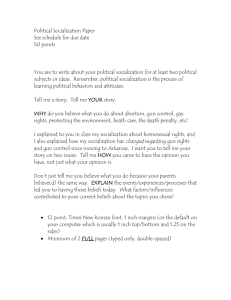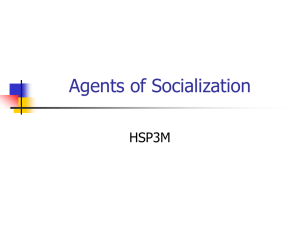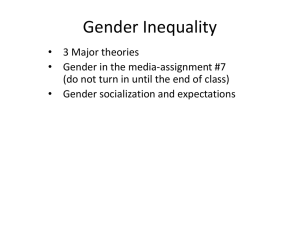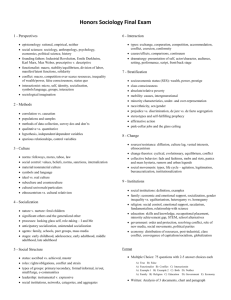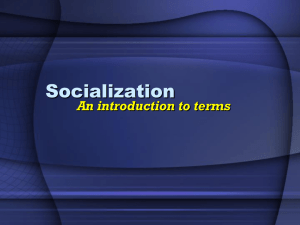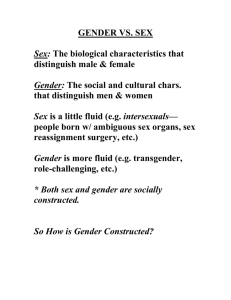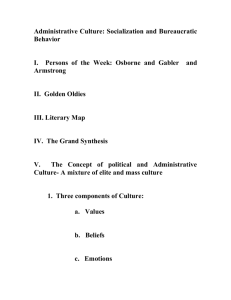do.
advertisement
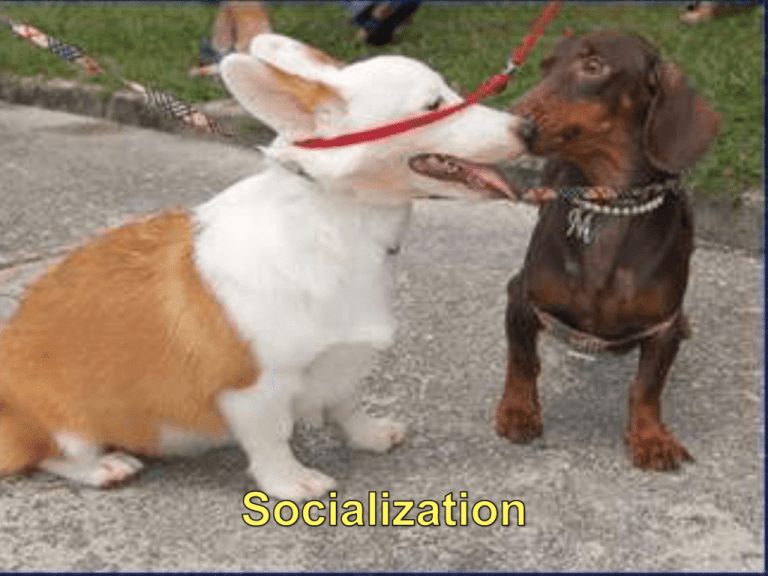
First: The Practice Test • • • • • F.I.B. and S.A. are EXAMPLES Essays are REAL On the test, you will receive a word bank There will be partial credit The online readings will also be covered Tell Me about yourself. • When you were growing up, did you generally fit in and know what do in social situations? • Or did you find yourself confused about how to carry yourself, what to wear, how to act around people? Socialization Socialization • The process by which we: – become aware of ourselves as part of a group, – learn how to communicate with others in the group, and – learn the behavior expected of us. (p. 129) What happened? • When you first went to college, did you have to go through a period of adjustment with: – Your friends “back home” (even if “back home” is 15 minutes away)? – Your family? – Yourself? Resocialization • Learning new sets of values, behaviors, and attitudes that are different from the ones you previously had (p. 137) Agents of Socialization • People, groups, or social institutions that socialize new members, either formally or informally. (p. 137) Agent: Family • First & Most • Families of different classes socialize kids in different ways: – Conformity vs. creativity • WHY? What about you? • What orientation were you socialized into? Does it fit the theory? Agent: Education • Obvious function: facts, concepts, skills • Latent function: “hidden curriculum” What do you think? • Are there any parts of the hidden curriculum that now, looking back, you can identify being taught? • How do you feel about that? Agent: Religion • U.S.: most religious in the world • Ready set of rules – little gray area, depending upon the faith And humans are exceptional at adapting And humans are exceptional at adapting What do you think? • In the language of socialization, what are these children actually doing? • (To the extent that you’re comfortable talking about it) Have you changed your belief system as you’ve gone through your life? • Why do think that is? Agent: Peers • Homogeneous • Learning about love • Positive? What do you think? • We often hear about “peer pressure” as a mode of socialization in youth. How strong a motivating factor do you think peer pressure is for teens? – Do you think it’s overblown? Underappreciated? Agent: Media • Americans: 6.5 hours a day with media • American kids: 3 hours a day on TV • Informal socialization – “creating a landscape” – NOT indoctrination, not brainwashing Example: racial values What do you think? • Think hard: can you think of other ways in which media socializes us into different roles, activities, etc? Agent: The Workplace • Defines self • Peer groups • “professionalize” What about you? • “What do you want to be when you grow up?” • What parts of it appeal to you? – Function? – Hours? – Interest/boredom? – Location? • How much of this is part of your identity? – Does it depend on what the job is? Gender socialization • “Tough Guise” clip • The idea: Gender isn’t something that you are, it’s something that you do. • Socializes us into certain behaviors. What do you think? • What do you think about Katz’ argument that everyone borrows their gender “performance” from someplace else? Gender socialization through notions of „hygiene‟ Socialization through toys Socialization through toys Socialization through toys Socialization through toys Socialization through toys Socialization through toys Socialization through toys • “The whole purpose behind a doll is to pretend like you’re a parent,” said Dennis Lewis, the American representative for Berjuan Toys, the Spanish company that makes the dolls. “The dolls are meant to just let kids play as mommies and daddies naturally.” Discussion question! • As we just saw, we socialize children into gendered behaviors all the time. Why are people in an uproar about this? • What does that say about gender socialization? Gender Socialization: The way we “go?” Gender Socialization: The way we “go?” Gender Socialization: The way we “go?” Discussion Question! • In what ways were you socialized ‘into’ or ‘out of’ your gender?


